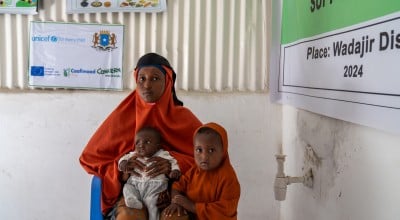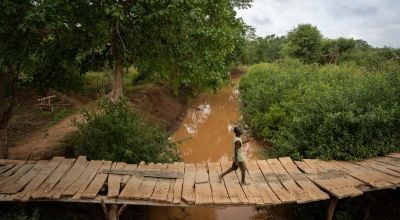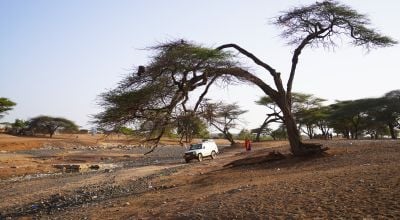
Read our 2024 annual report

Knowledge Hub
“I’m thankful for every instant” - a good news story from Somalia
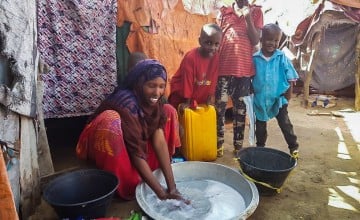
With help from the European Commission's Civil Protection and Humanitarian Aid department (ECHO), Concern's team in Somalia constructed 15 latrine blocks and a water kiosk with six taps in a camp for Internally Displaced Persons (IDPs).
The unthinkable
Good health, self-sufficiency, and dignity are among the key foundations to a good life. Imagine the trauma of being stripped of all three, through no fault of your own - and then being forced to abandon your home. It’s unthinkable for most of us, but this is exactly what happened to *Maryam and thousands like her.
Maryam is a 39-year-old mother of six children (3 girls and 3 boys) between the ages of 8 months and 14 years. For the past year she has been living in a camp for Internally Displaced Persons (IDPs) in Kahda district, Mogadishu with her children and husband. They came here from Baidoa in the central Bay region of Somalia, forced to leave by a relentless drought, which destroyed their business of growing and selling tomatoes.
Many challenges
My family and I ran away when the drought and the cholera in the region persisted."
“In Mogadishu I was looking for casual labour, going door to door in the town. It was never certain if I would get the day-to-day bread for the family, even after washing clothes, dishes, cleaning houses and so on for that day.” Sometimes Maryam would not get paid at all for the work she did.
There are few if any support systems in the informal displacement camps and many people are reliant on the goodwill of neighbors or occasional distributions from overstretched aid organisations. One of the biggest challenges here is the very thing that drove these families from their homes - lack of water.
When we were not having water provided in the camp, we used to fetch water from a distance, costing 2000 Somali Shillings per jerry can."
But it’s not just the scarcity of drinking water that caused problems. Living in rudimentary shelters on rough ground in close proximity to hundreds of other people brings the very real threat of disease. Poor sanitation is unavoidable.
Maryam tells us “The toilet problem was a serious problem because if someone is suffering from diarrhoea, they defecate where they are… it becomes a health problem to other people around us”
A woman’s dilemma
It’s an especially serious issue for women, who must routinely navigate the threat of sexual and physical violence.
Going to the toilet is one of the most dangerous things you can do as a woman living in a camp."
"We would go to the bushes during the night, as during the day everybody is looking at you from a distance - all eyes are on you. Imagine going to the toilet was one of the most dangerous things you could do in a day.”
And then there are the challenges posed by menstruation, when water for washing is so limited and there is little or no privacy.
Welcome relief
Then, in May 2017, Concern Worldwide came to Maryam’s camp. The team, using money from the European Commission's Civil Protection and Humanitarian Aid department (ECHO), got to work quickly. 15 latrine blocks were constructed in this camp alone, and a water kiosk with six taps was installed.
The difference that this basic infrastructure has made to the lives of people like Maryam and her family is amazing. There is clean and cost-free water for drinking, washing clothes, and keeping clean. Now there are safe and secure spaces for women and girls to use for their personal hygiene - and the risk of disease has decreased for everyone.
Maryam is literally ecstatic with the change in her family’s circumstances. “Water provision allowed me to get back to my feet, increased my independence and dignity,” she says. “Before this, I was fetching water from a distance… and the water I got was never enough
Where there is no water there is no life - now the water is nearer to my home and there is plenty. I’m thankful for every instant."
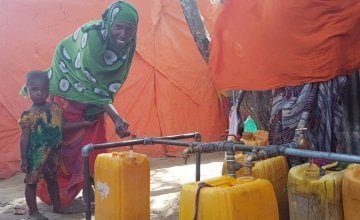
This story has been replicated across Somalia:
In 2017, thanks to funding from the European Commission's Civil Protection and Humanitarian Aid department (ECHO), Concern provided water to 6,648 households (1980 in Baidoa and 4668 in Mogadishu) through pipeline extensions with tap stands; 1 borehole was drilled benefiting 1,000 households in Awdal; 6 underground reservoirs (2 in Gedo and 4 in Awdal) were constructed benefiting 2,600 households; 7 shallow wells (3 in Somaliland and 4 in Gedo) were dug benefiting 2,800 households; 400 latrine blocks were constructed benefiting 2,000 households, and trucking of water to communities in the worst drought affected areas reached 7,000 households.
Hygiene promotion reached about 11,300 households. Furthermore, the same programme reached 23,500 households affected by drought and displacement with a monthly cash transfer to meet their food and other basic needs, and reached over 25,000 children under age 5 and their mothers with screening and treatment for malnutrition and basic healthcare.
*Name changed to protect identity.
You can help
Please help us to continue our life-saving work around the world by donating what ever amount you can afford.



